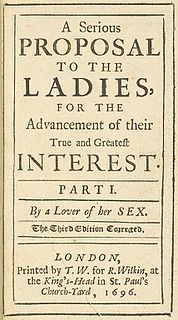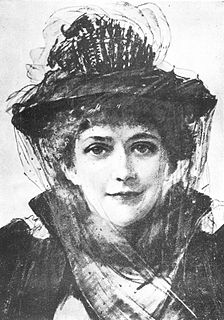Цитата Жана де ла Брюйера
Удовольствие, которое получает человек чести от осознания того, что он выполнил свой долг, есть награда, которую он платит себе за все свои старания.
Темы цитат
Связанные цитаты
Со своей стороны, я думаю, что Ученый и Неученый Болван довольно равны; ибо для меня все равно, говорит ли человек ерунду или непонятный смысл, я одинаково развлекаюсь и назидаюсь; тот меньше наслаждается собой, но больше позволяет своим Друзьям делать это; другой в достаточной мере наслаждается собой и своим юмором, но не позволяет никому другому делать это в его компании.
Пусть никто не думает, что он потеряет что-либо из человеческого достоинства из-за этой добровольной продажи всего своего Богу. Этим он не унижает себя как человека; скорее, он находит свое место в почете как человек, созданный по образу своего Творца. Его глубокий позор заключался в его нравственном помешательстве, в его неестественной узурпации места Бога. Его честь будет подтверждена тем, что он снова вернет украденный трон. Превознося Бога над всем, он находит свою высшую честь подтвержденной.
Даже когда человек испытывает боль из-за того, что шип вошел в его руку, хотя он тотчас же вырывается, это является наказанием, нанесенным ему, и малейшее удовольствие, которым он наслаждается, является наградой; все это отмерено строгой справедливостью; как сказано в Писании, "все пути Его - суд" (Втор. 32. 4); мы только не знаем о действии этого суждения.
Когда женщина подчиняется мужчине, это самый ценный подарок, который она может сделать. Сама. Безоговорочно. Мужчина должен уважать и чтить этот дар превыше всего. Даже если он не уважает больше ничего в мире, он должен уважать женщину, находящуюся на его попечении. Его поклявшийся долг защищать, чтить и лелеять своего сабмиссива. Позаботиться о ней и обеспечить безопасное убежище. Тот, кто ставит свои собственные потребности выше потребностей своей женщины, не является мужчиной.
Наш тезис заключается в том, что символы и мифы являются выражением уникального самосознания человека, его способности выйти за пределы непосредственной конкретной ситуации и увидеть свою жизнь с точки зрения «возможного», и что эта способность является одним из аспектов его переживания себя как иметь мир.
Обязанность благоразумного служителя Божьего — чтить свое служение и следить за тем, чтобы его уважали те, кто находится на его попечении. Более того, долг верного министра не превышать своих полномочий и не злоупотреблять своим служебным положением из гордости, а, напротив, управлять им на благо своих подданных.
Каждый человек важен для самого себя, а потому, по его собственному мнению, и для других; и, предполагая, что мир уже знаком с его удовольствиями и его страданиями, он, быть может, первый опубликует обиды или несчастья, которые никогда не были бы известны, если бы они не были рассказаны им самим, и над которыми те, кто услышат их, только посмеются, ибо никто не сочувствует печали тщеславия.
Какой бы ни была ситуация, в воспоминании о смерти есть награда и заслуга. Ибо даже человек, поглощенный миром, извлекает из этого пользу, приобретая отвращение к этому миру, так как он лишает его довольства и полноты его наслаждения; и все, что портит человеку его удовольствия и его аппетиты, является одним из средств избавления.









































